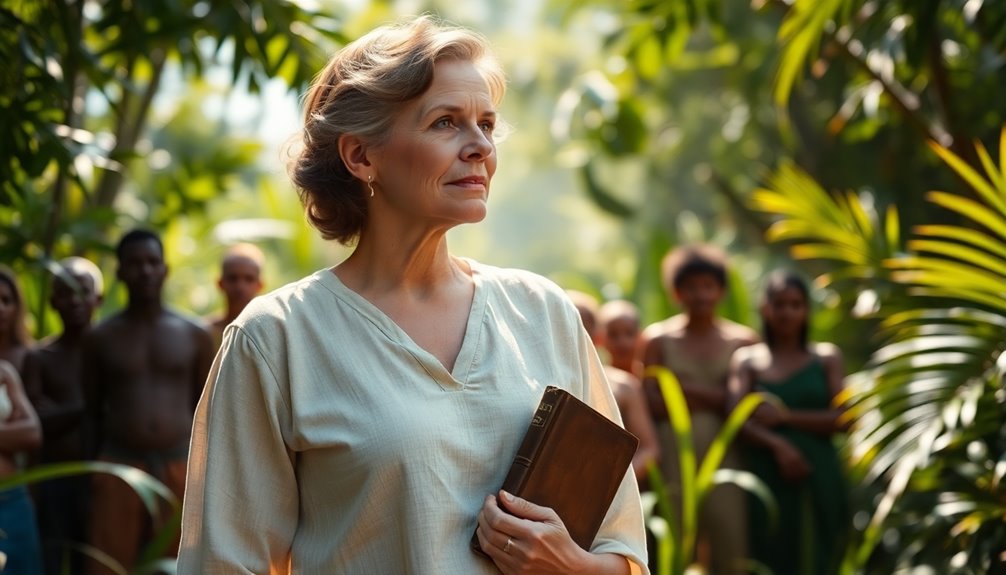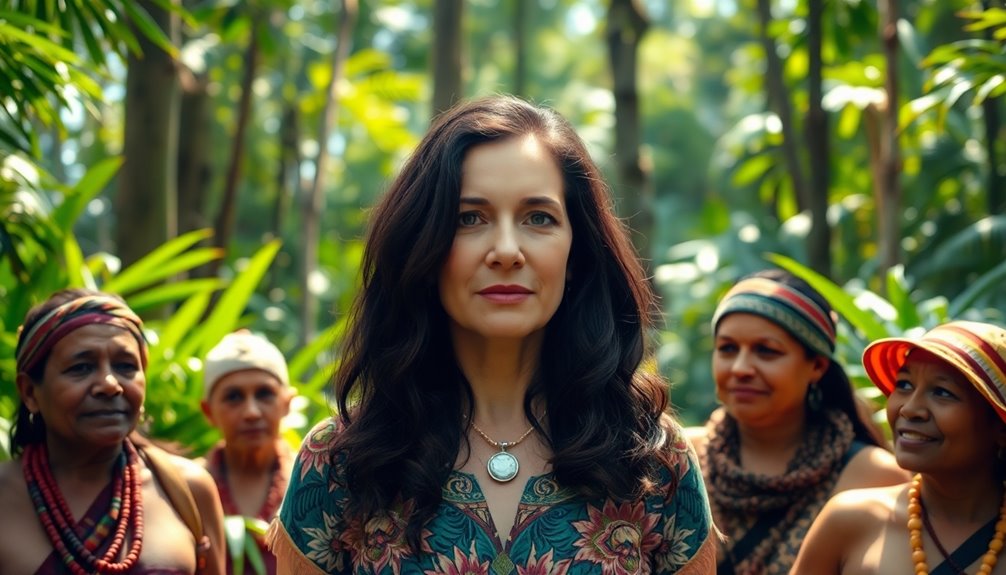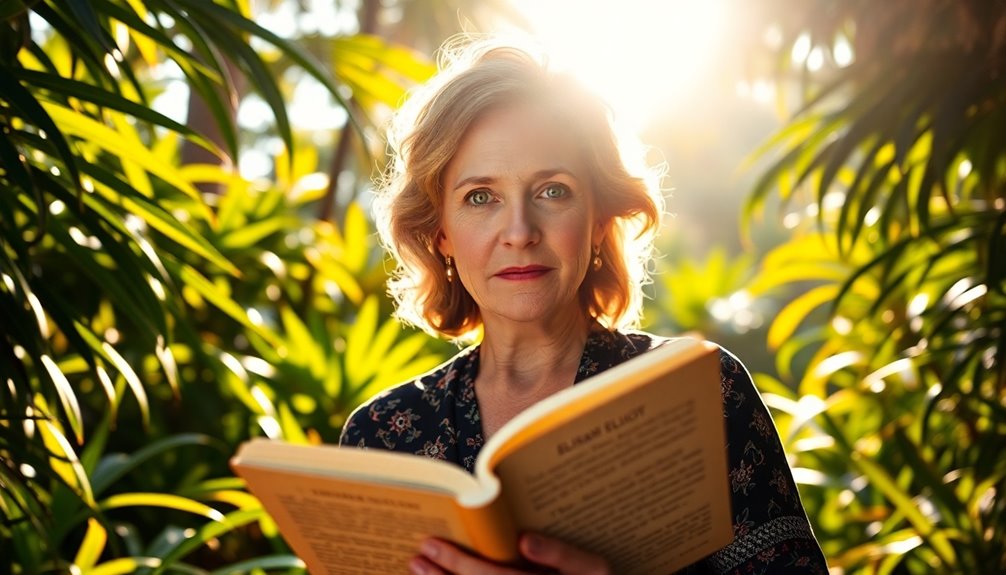Elisabeth Elliot's biography reveals a life filled with faith and adventure. Born in Belgium in 1926, she grew up in a missionary family, fueling her passion for service. After marrying Jim Elliot and moving to Ecuador, her resolve only strengthened after his martyrdom. Elisabeth worked tirelessly with the Huaorani people, learning their language and teaching them to embrace forgiveness. As an accomplished author, she inspired countless readers through her teachings on resilience and faith. Her unwavering devotion to God and mission shaped modern Christianity. If you're curious about her remarkable journey, you'll discover even more about her impactful life.
Key Takeaways
- Elisabeth Elliot was born in Belgium and raised in a missionary family, fostering her lifelong commitment to faith and missions.
- She married Jim Elliot and served the Tsáchila and Quichua Indians in Ecuador, significantly impacting indigenous communities.
- After Jim's martyrdom, she continued their mission, emphasizing forgiveness and reconciliation while developing a writing system for the Waodani language.
- Elliot authored 24 books and hosted the *Gateway to Joy* radio program, inspiring generations with themes of faith, suffering, and endurance.
- Her advocacy for women in faith and enduring legacy shaped modern evangelical Christianity, encouraging perseverance and trust in God's plan.
Early Life and Education

Elisabeth Elliot's early life was deeply influenced by her family's missionary background. Born on December 21, 1926, in Brussels, Belgium, she moved to Germantown, Pennsylvania, shortly after her birth. Growing up in a household with four younger brothers and a sister, you'd see how the values of love, order, and Christian faith permeated their home environment. Her father, a missionary and editor of the Sunday School Times, instilled a passion for missions in her from a young age.
As she lived in locations like Franconia, New Hampshire, and Moorestown, New Jersey, Elisabeth's dedication to Christian service grew stronger. Attending Wheaton College, she pursued classical Greek with the goal of translating the Bible for remote regions of the world. It was here that she met Jim Elliot, which would later play a pivotal role in her life. Her education at Wheaton College helped her prepare for her future in missionary work.
Her education and formative experiences, including her time in boarding school, reinforced her commitment to missions. This solid foundation in her early life prepared her for a future rich in missionary work and writing, setting the stage for the impactful life she would lead.
Missionary Work and Marriage

You'll find that Elisabeth Elliot's journey as a missionary began shortly after she married Jim Elliot in Ecuador. Their commitment to serve the Tsáchila and Quichua Indians set the stage for a life filled with both challenges and profound impact. Together, their marriage intertwined personal devotion with a shared mission, shaping their legacy in the world of evangelical Christianity. Their work was deeply influenced by Jim Elliot's martyrdom, which not only solidified Elisabeth's resolve but also amplified the public's interest in their missionary endeavors.
Early Missionary Experiences
From her early years, Elisabeth Elliot's life was intertwined with the calling of missionary work, shaped by her upbringing in a devout Christian family and her education at Wheaton College. At Wheaton, she focused on Greek for Bible translation, preparing herself for the mission field. After graduating, she moved to Ecuador as a single woman, enthusiastic to share her faith.
Elisabeth began working in Quito, offering literacy classes and teaching Scriptures to local communities. She learned the Ecuadorian Quichua language, equipping herself to engage deeply with the people. Despite the challenges, she persevered, fueled by her commitment to Christ. Her experiences illustrated the importance of self-denial, a key teaching that would later define her mission philosophy.
Consider these key aspects of her early missionary experiences:
- Foundation of Faith: Growing up in a household where Bible reading and prayer were central, she developed a strong spiritual foundation.
- Courage in Adversity: The martyrdom of admired missionaries like John and Betty Stam didn't deter her; instead, it strengthened her resolve.
- Focus on Education: Her dedication to language learning showcased her commitment to effective communication in sharing the Gospel.
Elisabeth's journey reflects a life driven by faith and a desire to serve others.
Marriage to Jim Elliot
Their love story began amidst the rigorous academic environment of Wheaton College, where Elisabeth Elliot and Jim Elliot first crossed paths in Greek classes. Despite Jim's initial intention to remain a single missionary, their bond grew through years of separation, nurtured by letters and journals. Their shared devotion to God framed their relationship as part of their spiritual journey. During their time apart, they demonstrated remarkable dedication through their passionate letters and journal entries.
They married in 1953, forming a partnership deeply rooted in faith. Their marriage produced one daughter, Valerie, who was only ten months old when Jim was tragically martyred. The following table highlights key aspects of their marriage and mission work:
| Aspect | Details | Impact |
|---|---|---|
| Courtship | Long-distance, letter-writing | Strengthened their spiritual commitment |
| Mission Work | Translating the New Scripture | Reached Indigenous tribes in Ecuador |
| Legacy | Jim's writings and Elisabeth's work | Inspired future generations of missionaries |
Though their time together was brief, their love and commitment profoundly influenced their mission, ensuring their legacy would endure. Elisabeth's continued work among the Waodani tribe after Jim's death solidified their shared faith and purpose.
Work With the Huaorani

When you think about Elisabeth Elliot's work with the Huaorani, consider how she learned their language and embraced their culture. You'll see the significance of her tribal name, Gikari, which symbolizes her deep connection to the people. Her efforts not only transformed the tribe but also left a lasting impact on missionary work around the world. Through her experience, she demonstrated the inevitability of suffering and how it can lead to profound spiritual growth and deeper faith.
Language Acquisition Journey
Elisabeth Elliot's language acquisition journey with the Huaorani was marked by determination and innovative methods. You can see her commitment in various stages, from her early studies in Classical Greek to her training at the Summer Institute of Linguistics. These endeavors equipped her to tackle the challenge of translating the New Scriptures into an unknown language.
- She learned the Waorani language through direct interactions, working closely with Dayuma, a Waorani refugee, and utilizing translations by Rachel Saint.
- In 1958, you witness her immersion in the culture, living with the Huaorani for two-and-a-half days by canoe, creating a welcoming atmosphere that was essential for effective communication. During this time, she emphasized forgiveness and reconciliation with the tribe, which fostered trust and openness.
- Elisabeth developed a writing system for the previously oral Waodani language, recording stories and vocabulary, which laid the foundation for future translations.
Her journey didn't just focus on acquisition; it aimed at preservation and education, culminating in a significant New Scriptures translation dedicated in 1992. Through her efforts, you can appreciate how language can bridge cultures and foster understanding.
Tribal Name Significance
The Huaorani, also known by variations like Waorani and Waodani, means "human" or "men" in their language, reflecting their self-identification as a distinct group. This name emphasizes their connection to humanity and highlights their cultural pride. In contrast, outsiders often used the derogatory term "Aucas," which translates to "savages" or "warring savages." Such labels fail to capture the complexities of their society and history.
Traditionally, the Huaorani inhabit regions from the Napo River to the Curaray River in Ecuador, where they form clans and families. Some groups, like the Tagaeri and Taromenane, choose to remain isolated, avoiding contact with the outside world. This choice preserves their way of life, distinct from modern influences. The establishment of the Waorani Ethnic Reserve, which covers over 6,000 square kilometers, reflects their efforts to protect their ancestral lands and uphold their rights against external threats.
Throughout history, the Huaorani have faced numerous challenges, including violent encounters with outsiders and threats to their territory from oil exploration and logging. In response, they established the Organization of the Huaorani Nation of Amazonian Ecuador (ONHAE) to defend their rights. Their name, embodying the essence of humanity, underscores their resilience and determination to maintain their identity amidst external pressures.
Lasting Impact on Missions
Lasting Impact on Missions (Work With the Huaorani)
Missionary work among the Huaorani left an indelible mark on the modern missions movement, reshaping how evangelism is approached in isolated communities. Elisabeth Elliot's commitment to forgiveness and reconciliation after the death of her husband and the other missionaries exemplifies a transformative approach to missions. This legacy continues to inspire countless individuals and organizations.
- Forgiveness as a Tool: Elisabeth's decision to live among the Huaorani, despite their involvement in her husband's death, highlighted the power of forgiveness in fostering relationships and bridging cultural divides.
- Cultural Understanding: By learning the Waodäni language and documenting their stories, she guaranteed that future missionaries could effectively communicate and connect with the tribe, promoting cultural respect. Additionally, her efforts contributed to the transformation of the Huaorani people as they turned from violence to a more peaceful existence.
- Sustainable Development: Her advocacy for education and church establishment within the tribe laid a foundation for long-term growth and development, moving the Huaorani from violence to a more peaceful existence.
Through these efforts, Elisabeth Elliot not only honored the memory of the "Ecuador Five" but also paved the way for a more compassionate and effective approach to missionary work in challenging environments.
Writing and Speaking Career

Throughout her writing and speaking career, Elisabeth Elliot profoundly influenced Christian thought and practice. You can see her impact in the 24 books she published, addressing themes like suffering, loneliness, and biblical manhood. Her book *Through Gates of Splendor*, a compelling account of her missionary experience in Ecuador, ranked ninth in *Christianity Today*'s list of the Top 50 books that have shaped evangelicals.
Elliot's bestseller, *Shadow of the Almighty: The Life and Legacy of Jim Elliot*, provides an intimate look at her husband's life and legacy. She also authored novels, such as *No Graven Image*, critiquing the church's idolization of missionaries. Her linguistic work with the Waodani people led to the development of a writing system and contributed to the translation of the New Testament into their language. In the 1960s, many Waodani tribe members accepted Christianity, marking a significant transformation in the community she served. This transformation emphasizes the importance of navigating tiny pitfalls in the journey of faith and growth.
As a speaker, she hosted the daily radio program *Gateway to Joy* from 1988 to 2001, sharing her insights on faith. You'd find her teaching at Gordon Conwell Theological Seminary and speaking on various topics, making her a sought-after voice for those grappling with faith amid life's challenges.
Later Marriages and Life

Following her impactful writing and speaking career, Elisabeth Elliot entered into two notable marriages that shaped her later life. Her second marriage to Addison Leitch, a seminary professor, began in 1969 after his first wife passed away. This relationship, which Elisabeth considered the great love of her life, was notable but brief, ending with Addison's death in 1973. Notably, her time with Leitch marked a shift towards a more conservative perspective on women's roles, which became evident in her later writings.
In 1977, Elisabeth married Lars Gren, a man nine years her junior. While their relationship started with a courtship grounded in prayer, it quickly devolved into a controlling and manipulative dynamic. Lars dictated many aspects of Elisabeth's life, notably impacting her freedom and autonomy. Despite these challenges, she maintained a public persona, continuing her speaking engagements under Lars's management.
Here are three key takeaways from Elisabeth's later marriages:
- Emotional Impact: Elisabeth's relationships highlighted her deep longing for love and connection, often leading to complex dynamics.
- Control and Autonomy: Lars's controlling behavior drastically affected Elisabeth's independence and her relationships with family.
- Theological Reflections: Her experiences shaped her writings, promoting themes of submission that resonated with her tumultuous marital life.
Legacy and Impact

Elisabeth Elliot's legacy and impact extend far beyond her own life, resonating deeply within the Christian community and missions worldwide. Her courageous return to the Waorani people after her husband Jim's martyrdom transformed the tribe and inspired countless Christians to embrace missionary work. The deaths of Jim and other missionaries ignited a fervor for missions in the 1950s and 1960s, with her writings like *Through Gates of Splendor* moving many to action. In addition, her dedication to learning the Quichua language before marriage exemplified her commitment to effective communication in her missionary endeavors.
Here's a glimpse of her contributions:
| Aspect | Details |
|---|---|
| Missionary Work | Returned to Waorani, leading many to faith |
| Influence through Writing | Authored 24 books addressing key themes |
| Family Legacy | Daughter Valerie shares their story publicly |
Elisabeth's radio program, *Gateway to Joy*, and her teaching at Gordon Conwell Theological Seminary further underscore her commitment to guiding others. Her unwavering faith, even during personal struggles, solidifies her legacy as a beacon of hope, sacrifice, and devotion that continues to inspire generations today.
Key Publications

Elliot's influence is also profoundly captured in her key publications, which have guided and inspired readers across generations. Her works explore faith, relationships, and the complexities of missionary life, offering profound insights into the Christian journey. Notably, she authored a total of 48 books that reflect her extensive dedication to these themes. Many of her readers find comfort in her writing, similar to how cruise passengers seek all-inclusive packages that enhance their travel experiences.
Here are three key publications that stand out:
- Through Gates of Splendor (1957) – This powerful account of the five missionaries, including Jim Elliot, showcases their unwavering commitment and sacrifice while serving the Auca Indians in Ecuador. It's a stirring evidence of their faith.
- Passion and Purity (1984) – In this book, you'll find guidance on traversing love and relationships through a Christian lens. Elliot's reflections help you understand how to bring your romantic life under Christ's control.
- Suffering Is Never for Nothing (2019) – This poignant work, her final major publication, offers deep reflections on the purpose behind suffering, encouraging readers to find hope and meaning even in the darkest times.
Through these key publications, Elliot's voice continues to resonate, providing wisdom and encouragement to those seeking to deepen their faith.
Influence on Modern Christianity

The profound influence of Elisabeth Elliot on modern Christianity can't be overstated, as she reshaped the landscape for women in the faith and emphasized the importance of sacrificial love and forgiveness. By courageously staying in the Ecuadorian jungle to minister to the very people who killed her husband, you see her extraordinary commitment to embodying Christ's love. She championed self-denying authority in family roles, encouraging both men and women to embrace their God-given responsibilities in complementary ways.
Elisabeth's impact extends beyond her personal sacrifices. Through her popular radio show, writings, and speaking engagements, she inspired countless women to embrace their strength and intelligence. You might find her advocacy for forgiveness and perseverance particularly compelling; she lived out these values daily, even after losing two husbands. Her message of "Do the next thing" resonates as a call to trust God's plan amidst uncertainty. Furthermore, her teachings on the importance of prayer highlighted how cultivating a life of prayer can nurture family relationships and spiritual growth.
Moreover, her contributions to theological discussions challenged traditional views while promoting honesty and creativity within evangelical circles. By reflecting God's orderliness in her life and encouraging others to do the same, Elisabeth Elliot truly paved the way for a more vibrant and engaged Christian community.
Frequently Asked Questions
What Motivated Elisabeth Elliot to Become a Missionary?
You might think tragedy would deter someone, but it fueled your passion for missions. Deep faith, compassion for the lost, and a commitment to God's calling drove you to share the Gospel, despite personal costs.
How Did Her Husband's Death Impact Her Life?
Your husband's death profoundly shapes your life, driving you to continue his mission, learn new languages, and connect with the Huaorani tribe. This loss ignites your passion for faith, writing, and inspiring others.
What Languages Did Elisabeth Elliot Speak Fluently?
When it comes to languages, you'll find Elisabeth Elliot spoke English fluently, and she learned Ecuadorian Quichua, Wao Tededo, and Colorado for her missionary work, showcasing her dedication to effective communication and cultural connection.
Did Elisabeth Elliot Have Any Formal Theological Training?
Yes, she did have formal theological training. You'll find she studied at Wheaton College and later at the Prairie Bible Institute, where she gained valuable knowledge that influenced her missionary work and writings notably.
What Was Her Role in the New International Version Bible Translation?
Oh sure, translating the Bible's a piece of cake! You'd've loved Elisabeth Elliot's role as a stylistic consultant for the NIV, ensuring it spoke in contemporary English while maintaining biblical integrity through teamwork and rigorous reviews.










